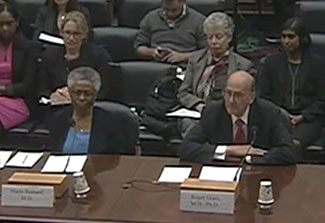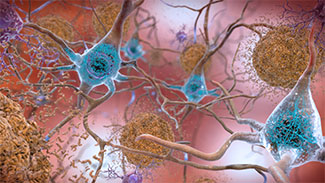NIH updates Congress on global Alzheimer's disease epidemic
January / February 2018 | Volume 17, Number 1

Screenshot from House Foreign Affairs Committee webcast
Dr. Marie Bernard of the National Institute on Aging (NIA) at
NIH and Fogarty Director Dr. Roger I. Glass testify on
Alzheimer's disease and other forms of dementia.
More than 35 million people globally are living with the devastating symptoms of Alzheimer's disease and other forms of dementia, with that number expected to double almost every 20 years. Those heart-wrenching facts were included in testimony two NIH scientists provided to a recent congressional hearing on the epidemic. Held by the House Foreign Affairs Subcommittee on Africa, Global Health, Global Human Rights and International Organizations, the session was intended to give an update on the worldwide incidence of dementia, scientific advances and research prospects.
"We are in a race like few other diseases because it is proliferating so fast throughout the globe," noted Rep. Christopher Smith (R-NJ), who chairs the subcommittee. The total estimated global cost of addressing this condition is $818 billion and rising fast, he said, but the human toll is immeasureable. "It is excruciatingly painful for someone to lose themselves gradually, and I have spoken myself to many individuals, especially those who are early onset who have young families and are dealing with the agony that they know it is progressing."

Image courtesy of NIA
Beta-amyloid plaques and tau in the brain
There is some cause for optimism, with international collaboration and data sharing projects "blossoming" and providing unprecedented scientific opportunities for Alzheimer's research, said Dr. Marie Bernard, deputy director of the NIH's National Institute on Aging. In addition, studies of genetic risk factors are progressing, including drug trials to see if Alzheimer's can be prevented at its earliest stages, she said. One site in Colombia is testing the intervention in an extended family with a hereditary, early-onset form of the disease.
"We need to find the brightest minds everywhere to assist in this endeavor, as well as to identify populations with unique environmental or genetic risks, because the high-quality research that we do doesn't happen only in the United States. It happens elsewhere," said Fogarty Director Dr. Roger I. Glass, whose father suffered from Alzheimer's. In order to take advantage of these scientific opportunities, it's critical that foreign researchers be trained through programs such as Fogarty's, Glass added.
Subcommittee member Rep. Daniel Donovan (R-NY), who watched his mother succumb to Alzheimer's, expressed hope for a cure and noted the enormous burden the disease takes on families. "If you are successful in finding a treatment, it will pay for itself."
More Information
-
A global update on Alzheimer's disease
Recorded webcast, transcript and official statements from the U.S. House Foreign Affairs Subcommittee on Africa, Global Health, Global Human Rights and International Organizations, November 29, 2017
To view Adobe PDF files,
download current, free accessible plug-ins from Adobe's website.